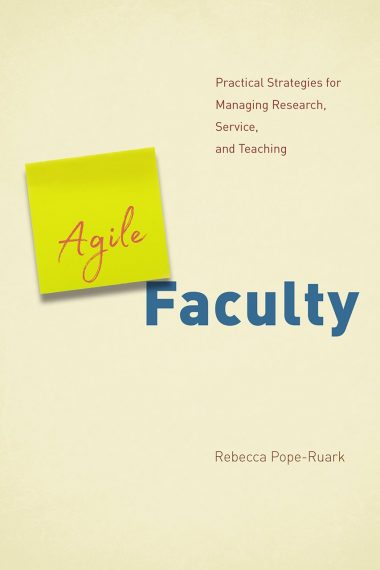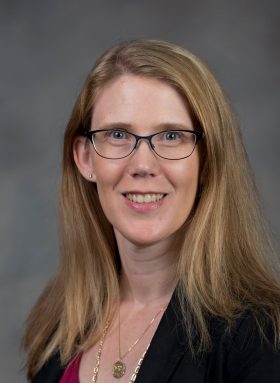A first book by Rebecca Pope-Ruark, associate professor of English, published by the University of Chicago Press looks at how the popular Agile project management techniques can be applied in the classroom and in research work.
A new book by Elon’s Rebecca Pope-Ruark will be a tool faculty can use to leverage the benefits of Agile, a project management framework that’s proved popular in the tech world.
 “Agile Faculty: Practical Strategies for Managing Research, Service and Teaching” was published by the University of Chicago Press and is the result of years of work by Pope-Ruark, associate professor of English. The central idea behind the book was generated after Pope-Ruark joined the Elon faculty in 2007 and continued to develop as she fleshed out the project as a Center for the Advancement of Teaching and Learning Scholar in 2013. Pope-Ruark coordinates the Professional Writing and Rhetoric program as well as the Design Thinking in Social Innovation immersive semester program.
“Agile Faculty: Practical Strategies for Managing Research, Service and Teaching” was published by the University of Chicago Press and is the result of years of work by Pope-Ruark, associate professor of English. The central idea behind the book was generated after Pope-Ruark joined the Elon faculty in 2007 and continued to develop as she fleshed out the project as a Center for the Advancement of Teaching and Learning Scholar in 2013. Pope-Ruark coordinates the Professional Writing and Rhetoric program as well as the Design Thinking in Social Innovation immersive semester program.
Her new book is designed to help faculty members as they organize coursework for students, develop an agenda for their personal research and interact through committee work with fellow faculty on campus. Pope-Ruark said she initially began trying out Agile concepts in her own classroom after discussing Agile with her husband, who is a software developer.
In creating project-based work for her students, she realized that she was encouraging them to work together without providing much guidance on them how to collaborate effectively. “As important as I knew collaboration was, I knew that I wasn’t teaching it very well,” Pope-Ruark said. “With software developers, they tend to be more isolated in their work but they can accomplish so much more when they do collaborate and depend on each other and know what other team members are doing.”
Agile principles provide the foundation for an iterative approach that relies heavily on frequent interaction and assessment by members of the team. Through an overall framework based on Agile principles and called Scrum, a project is broken up into smaller pieces called stories, with teams tackling those smaller goals through intense two-four week sessions called sprints. Regular communication through Scrum meetings helps the team assess what’s been accomplished, direct resources to areas that need attention and provide ongoing feedback on progress and goals.
“It’s a framework for doing work, but it doesn’t tell you how to do it or what to do,” Pope-Ruark said. “It helps you figure out the bigger things you have to accomplish and what are actionable tasks to accomplish that.”
 In the classroom, Pope-Ruark said Scrum meetings allow each member to talk about what they’ve done since they last met, what they are working on now, and where they might need some help. “It’s really hard to hide in that meeting,” Pope-Ruark said. “It naturalizes asking for help. You don’t have to hide that you need help. We all have the same goals, and we can discuss how we can make sure we all get there.”
In the classroom, Pope-Ruark said Scrum meetings allow each member to talk about what they’ve done since they last met, what they are working on now, and where they might need some help. “It’s really hard to hide in that meeting,” Pope-Ruark said. “It naturalizes asking for help. You don’t have to hide that you need help. We all have the same goals, and we can discuss how we can make sure we all get there.”
“Agile Faculty” offers guidelines on how to organize a course within the Agile framework to encourage collaboration, and helps faculty members deploy these techniques as they pursue their own research projects, either in collaboration with peers or on their own. Practicing what she’s preaching, Pope-Ruark used Agile techniques to help organize and guide her work on this book.
The book includes a section of how to apply Agile to faculty work on campus and academic committees. Pope-Ruark said this piece of the book is more hypothetical and less rooted in her own personal experiences, and she is excited to see how the academic community might put these concepts into practice on their own campuses.
Her hope is that the book will in a sense be a living work, with those who read it and deploy its concepts circling back with her to talk about their experiences. That feedback could help enhance future editions of the book, or spawn collaborations that build upon the idea of using Agile in an academic context.
“If this is an Agile book, then you can try it out, and tell me how it works,” Pope-Ruark said. “Then we can republish, and show how it works.”


